This article is 2 years old. Images might not display.
Professor Flower has a broad farming systems skillset, including conservation farming/no-till systems, agronomy and cropping systems, precision agriculture, and weed control.
"Despite successes in integrated weed management, we are still heavily dependent on herbicides for weed control and weed resistance is an increasing threat," Professor Flower said.
"My aim is for the AHRI team to show leadership in developing grain production systems with less reliance on herbicides.
"The paradigm in agriculture is changing with rapid advances in technology and data science, yet the application of new technology has been focussed on single solutions, rather than delivering long term impact.
"I believe AHRI can play a leading role by developing a cropping systems approach, so that new technology solutions are pragmatic and based on their long-term weed control impact. Also, no single organisation can provide all the solutions, so a collaborative approach is essential."
The AHRI is a national initiative based at UWA with major investment from the Grains Research and Development Corporation (GRDC).
Weeds cost Australian grain growers an estimated $3.3 billion per year, or $146 per hectare.
GRDC managing director, Nigel Hart, welcomed Professor Flower to his new role with one of the world's leading organisations in herbicide resistance research.
"GRDC invests approximately $1.5 million each year in AHRI on behalf of Australian grain growers, because the organisation delivers critical research and knowledge that is helping growers manage current and emerging weed threats," Hart said.






















